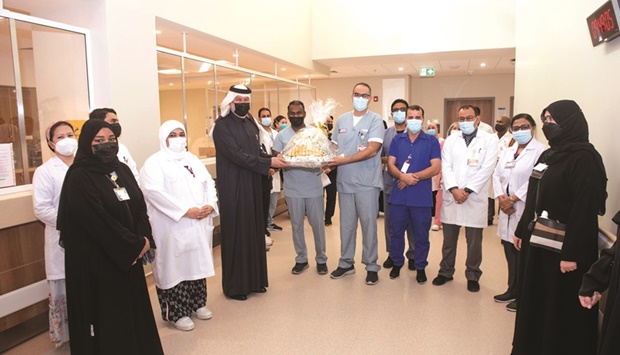Mesaieed General Hospital (MGH) was opened in April 2020 to meet the spiraling demands for hospital beds due to the Covid-19 pandemic but dwindling number of acute cases have opened the opportunity for the hospital to be redeployed more effectively. Over 90 geriatric male and female adult long-term patients have been transferred over the past month to receive excellent care in a healthcare environment deemed more age appropriate.
The new 120-bed state-of-the art facility offers a combination of single and twin-bed hospital rooms, a gym for occupational and physical therapy, space for patients to meet comfortably with family members in a quieter environment. The strategic decision to relocate stable non-Covid geriatric patients to MGH was jointly suggested by the Hamad Medical Corporation’s Chief Medical Officer, Dr Abdulla al-Ansari, and Dr Sabah Alkadhi the Interim CEO and Medical Director of Al Wakra and Mesaieed Hospitals and approved by chairperson for the Department of Geriatrics and Long-Term Care and medical director for Rumailah Hospital and Qatar Rehabilitation Institute, Dr Hanadi al-Hamad.
Dr al-Ansari explained: “Mesaieed General Hospital provides an ideal care environment for these geriatric patients. While they need ongoing medical monitoring, they do not need to be in an acute care facility. Our model supports delivering the right care by having the right people in the right place at the right time.”
“By relocating these patients here, we not only provide them with a superior healing environment but also ensure that over 90 acute-care beds have been made available in our other specialist hospitals for patients who are more in need of acute clinical care. The collaboration between Hamad General Hospital, Rumailah Hospital, Hazm Mebaireek General Hospital and Al Wakra Hospital has been excellent and has enabled us to provide better hospital bed utilisation across our system,” added Dr al-Ansari.
Dr Hanadi al-Hamad, said: “Geriatric patients who need hospital care benefit from receiving specialised care provided by trained geriatricians, nursing and allied health professional staff, such as occupational and physiotherapists. These patients tend to have more co-morbid chronic illnesses and disability, and they require age-appropriate management to lessen the risk of adverse events during hospitalisation, such as becoming confused, experiencing delirium or falls, which can lead to a rapid decline in the functioning of the older patient.”
“Mesaieed General Hospital has so many benefits for these patients as it offers excellent medical and therapeutic facilities but in modern, bright yet less busy and noisy environment compared to several of HMC’s larger hospitals with a more acute care remit,” remarked, Dr Sabah Alkadhi. Mariam al-Mutawa, acting chief nursing officer at HMC emphasised the importance of experienced nursing care when dealing with geriatric patients: “Nurses generally spend a longer time with patients providing direct care. A solid level of geriatric knowledge to understand the older person’s complex problems, identify their needs, plan and provide high quality care is an essential aspect of delivering compassionate and effective patient centered care.”
MGH is managed by Al Wakra Hospital, with the operational management handled by Rumailah Hospital and the Geriatric and Long-Term Care Department. Dr Osman Nemeri, consultant geriatrician and MGH clinical lead said that the highly supportive executive leadership has helped establish collaborative multidisciplinary teams, which have had a huge positive impact on patient care.
Dr al-Ansari explained: “Mesaieed General Hospital provides an ideal care environment for these geriatric patients. While they need ongoing medical monitoring, they do not need to be in an acute care facility. Our model supports delivering the right care by having the right people in the right place at the right time.”
“By relocating these patients here, we not only provide them with a superior healing environment but also ensure that over 90 acute-care beds have been made available in our other specialist hospitals for patients who are more in need of acute clinical care. The collaboration between Hamad General Hospital, Rumailah Hospital, Hazm Mebaireek General Hospital and Al Wakra Hospital has been excellent and has enabled us to provide better hospital bed utilisation across our system,” added Dr al-Ansari.
Dr Hanadi al-Hamad, said: “Geriatric patients who need hospital care benefit from receiving specialised care provided by trained geriatricians, nursing and allied health professional staff, such as occupational and physiotherapists. These patients tend to have more co-morbid chronic illnesses and disability, and they require age-appropriate management to lessen the risk of adverse events during hospitalisation, such as becoming confused, experiencing delirium or falls, which can lead to a rapid decline in the functioning of the older patient.”
“Mesaieed General Hospital has so many benefits for these patients as it offers excellent medical and therapeutic facilities but in modern, bright yet less busy and noisy environment compared to several of HMC’s larger hospitals with a more acute care remit,” remarked, Dr Sabah Alkadhi. Mariam al-Mutawa, acting chief nursing officer at HMC emphasised the importance of experienced nursing care when dealing with geriatric patients: “Nurses generally spend a longer time with patients providing direct care. A solid level of geriatric knowledge to understand the older person’s complex problems, identify their needs, plan and provide high quality care is an essential aspect of delivering compassionate and effective patient centered care.”
MGH is managed by Al Wakra Hospital, with the operational management handled by Rumailah Hospital and the Geriatric and Long-Term Care Department. Dr Osman Nemeri, consultant geriatrician and MGH clinical lead said that the highly supportive executive leadership has helped establish collaborative multidisciplinary teams, which have had a huge positive impact on patient care.

